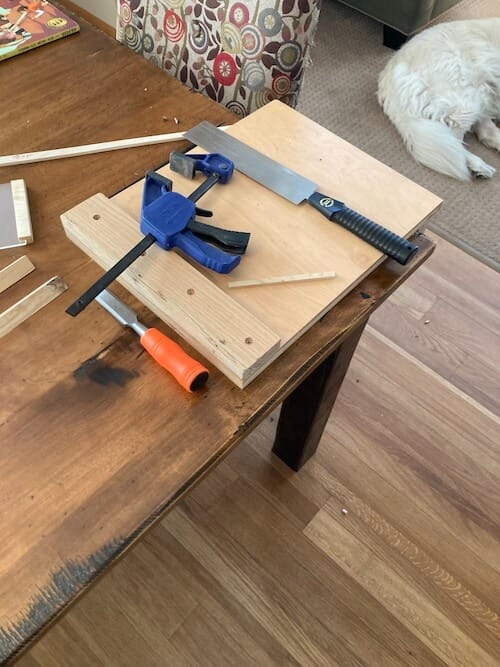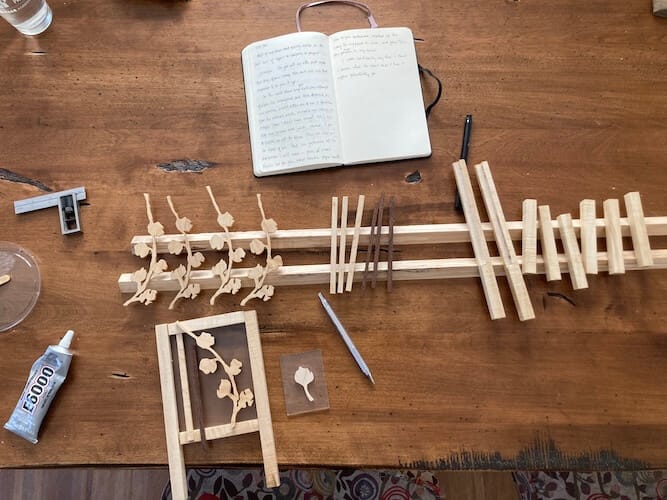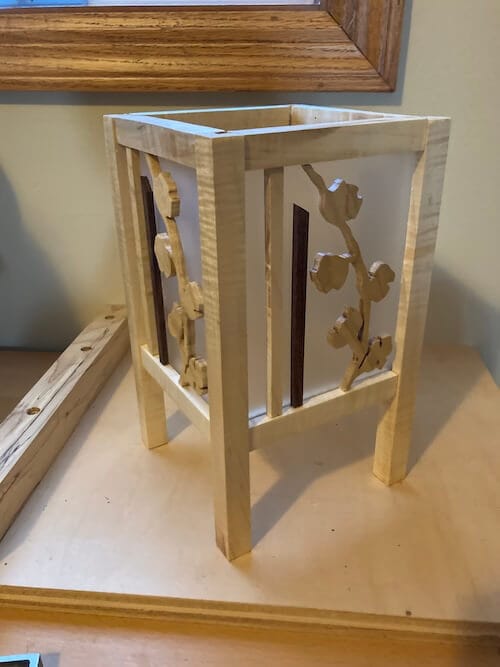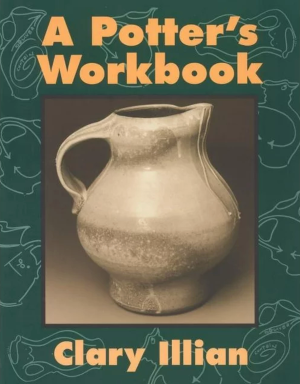Passion, struggle, and carving out a place in craft
It is a gift to get to choose to do this work. Struggling is part of the payment for that gift.

Hello and brief update (that will not become an essay!): I finished the first part of gluing up my little flower lamp.



It was cold in my shop and instead of turning on the heater, I decided to work at our dining table. I told Josiah, my infinitely patient yet bullheaded partner, that if I had my druthers, our family would move out to the garage and I could turn the entire house in my wood shop. I don't think he'll be acquiescing to the brilliance of my idea anytime soon.

My essay is below. I hope your next week is filled with brilliant ideas that you're able to make a reality!
Tell me your reasoning and I'll tell you mine
“Handmade objects are an antidote to a soulless world flooded by products made with a minimum of effort for maximum profit and no reverence for natural materials.”
This is what I’ve been telling myself as I diligently attempt to hand-make items in my shop. The words were written by potter Clary Illian from a chapter in her book A Potter’s Workbook. A friend gave me that chapter to read and I followed it up by looking into the documentary series, Craft in America, one episode of which featured Illian alongside other potters.

In Illlian’s chapter, she wrestles with ideas about learning, aesthetics, who gets to decide what qualifies as art, decorative work versus utilitarian work (that’s reductive, but this list is meant to be a taste, not a meal), and the all important issue of money.
“There can be no doubt: handmade pots are made by privileged people for privileged people. The potter’s privilege is not necessarily one of wealth or class but one of education and the freedom to succeed out of the mainstream. Potters can choose a life dedicated to pursuing excellence and individuation rather than a life given over to surviving. In a sense, they are privileged because they have the luxury of being idealistic. Although it is a struggle to make a living making pots, it is the struggle of any entrepreneur who wants to create a product or service with integrity.”
I appreciate how deftly she untangles the notion of struggling from that of surviving. I’ve done both. To say I learned some survival behaviors as a child that do not serve me as a middle-aged, middle-class mom is an understatement. The upshot is I’m very alert to my surroundings and good at saving money. And I appreciate food like a person consuming her last meal before purgatory. (There’s a reason I call myself the hungry woodworker.)
And yet, it’s all about perception, because dire circumstances are not my reality now. The struggle of trying to make a living making handmade items can mimic those earlier-in-life primal fears, cuing a stress response that is unhelpful at best and likely weakening my heart at worst. Illian’s words are like cold, spring water washing over those fears, putting the entire enterprise into perspective.
It is a gift to get to choose to do this work. Struggling is part of the payment for that gift.

“The widening gap between rich and poor and the heavy expenses of education and starting a business make this desire increasingly unrealistic,” Illian writes. The desire she’s referencing is the notion that quality, handmade items, such as the pots she and other produce, are good for all people, not just the wealthy who have access to afford nice extras.
High-quality items command a certain reverence and care. They can also be a reference point to a person’s internal values; a signal to their aesthetic style, a clue as to what brings them visual delight. Such an item can spark curiosity in others to know more, lead to conversations about why this particular piece, where was it found? What’s the story behind it being here, now, in your living space?
Well-made furniture or decor can be gifted to others as a way of expressing the depth of love with which they are held. Or passed along to loved ones or offspring, becoming part of the familial lore. Handcrafted items arrive with a story—that’s part of what you get when you buy or receive such a product—one ready to weave into your story, to co-create with you.
Who doesn’t deserve this? Are only people with enough income worthy?

And to the maker. Crafting anything by hand takes a lot of time. Even if you’re good at what you do with years of muscle memory and experience flowing through your fingers. And even longer still if you’re a beginner learning and practicing new techniques.
What is that time worth? Do you charge by experience and expertise? By the amount you need to pay yourself a living wage? From every craftsperson I’ve talked to, this last is shambolic—pricing items in a way that makes the maker whole in terms of time and expenses means that most items are beyond the means of the majority of people. Most artisans aren’t surrounded by wealthy clients awaiting our every creation.
But really we aren’t ever made whole by money. That’s not the reason behind this kind of work. The opportunity to do the work itself is what makes us whole. Those moments when it’s going well and the image in our minds is becoming reality in the world. Those moments when the effort is challenging yet doable. When you get to see someone’s face light up with enjoyment at the thing you’ve been laboring on for hours and weeks or even longer. If we are not scraping by in survival mode, then I think it’s the work that fills in our soul’s cavities.
Yet we still have to earn enough money to get by. The work can be hard, but I think the real struggle in being a craftsperson is figuring out that balance between getting paid enough to live and charging what people can afford. (And for this craftsperson, not getting so mired in thoughts about all this that it keeps me from taking action at all. Sometimes I long to put my brain on neutral mode, where I just coast, not pulling in too much detail from the world, not worrying ideas into knots, just coast with a spirit of gratitude that any of this is even possible.)
“We cannot know the shape of the future,” writes Illian. “Indeed, we can hardly perceive the shape of the time in which we live. We can only dedicate ourselves to those activities we find meaningful and believe would be relevant in the best of all possible worlds.”
Thank you for reading! If you enjoy the newsletter, would you consider sharing it with one other person you think might also like it?
